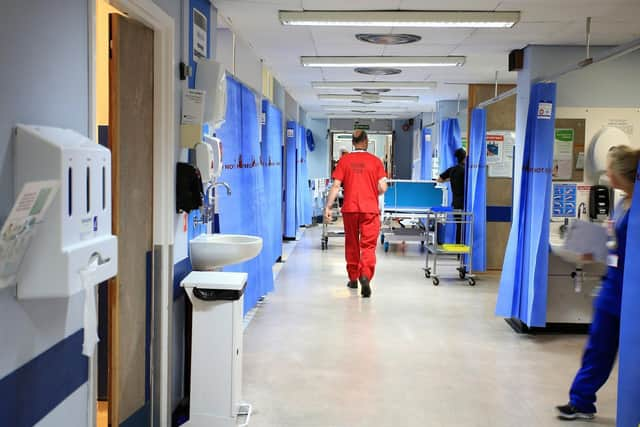Shameful neglect of the NHS could be decisive for the Tories - Andrew Vine
It’s of strain and tension, of everybody being rushed off their feet as staff dash from one task to another, a sense that this is an environment where unless they work flat-out for every hour of every day, the whole thing is going to come crashing down.
I’ve noticed this when visiting a couple of people who have been patients, both of whom have tales to tell of what they heard from staff on a daily basis – of gaps in rotas that are never filled, so wards are running on much lower numbers than they should have.
Advertisement
Hide AdAdvertisement
Hide AdStaff goodwill keeps them at work for longer than they should be, just to cover gaps, and they pay for their dedication with burnout. A neighbour whose daughter is an intensive care nurse says when she gets a day off, she sleeps for most of it, such is the depth of her exhaustion.


The evidence that the NHS is in crisis is everywhere – ambulances queuing for hours before patients can be admitted, lengthening waiting lists for treatment and the difficulties so many people have in getting an appointment with their GP.
It’s also to be seen in the number of people going private for treatment, if they can afford to, because using their savings is a lesser evil than enduring many months, or even years, of discomfort whilst they wait for an operation.
Yesterday’s report by Parliament’s Health and Social Care Committee underlined just what a sorry state the NHS is in.
Advertisement
Hide AdAdvertisement
Hide AdIn what the committee described as the worst staffing crisis in in history, the service is short of 50,000 nurses and midwives and 12,000 hospital doctors. At the same time, waiting lists reached a record high of nearly 6.5m people in April. The shortages, the report added, create a serious risk to patient safety. Things are no better in social care, which will need an additional 490,000 staff within the next decade if the system is to function.
Unsurprisingly, given the pressure caused by shortages, millions of working days are being lost every year because staff are off sick with anxiety, stress and depression.
The scale of the shortages is shocking in itself, but what is equally jaw-dropping is the Government’s response to them.
The committee says it has no credible strategy for filling the gaps, and has shown a “marked reluctance to act decisively” or even publish any firm ideas about how the crisis is to be addressed.
Advertisement
Hide AdAdvertisement
Hide AdThis amounts to just about the most damning indictment there could be of any Government. Allowing a service that is absolutely central to the wellbeing of millions of people to sink into a state where it is short of thousands of staff needed to run it is a failure at every level – of day-to-day management as well as long-term strategic thinking.
It’s a pity the committee did not publish its report before Parliament broke up for its summer recess, because it might have wiped the smirk off Boris Johnson’s face as he had the nerve to tell the Commons that his mission had largely been accomplished.
What is clear is that the crisis in the NHS cannot be blamed solely on the strain the pandemic put it under – though that has undoubtedly made matters much worse, especially in terms of waiting lists lengthening to an unacceptable degree.
Staffing shortages this bad have obviously built up over time as people left the NHS, many certainly because the pressure they were under had become intolerable.
Advertisement
Hide AdAdvertisement
Hide AdAnd nobody in the Government can say that they have not been warned about the looming crisis. Long before Covid appeared, bodies representing medical staff were flagging up increasingly urgent concerns about how badly the system was creaking. Why didn’t successive Health Secretaries take these warnings seriously?
Waiting lists have been steadily growing longer for years, end every winter brings the familiar spectacle of people in accident and emergency departments spending hours on trolleys before a bed can be found for them.
Yet in response to clear signs that the NHS was buckling under pressure, there has been inaction and complacency.
A Prime Minister and Government which came to power priding themselves on being in touch with the public opinion, either did not realise or did not care that the people of the country expect their health service to be given the resources it needs. Whoever is the next occupant of 10 Downing Street might well discover to their cost that it is not the aftermath of Brexit, concerns about immigration or the scale of taxation that determines their popularity – or lack of it – whenever the next election is held.
The NHS – prized by British people, yet shamefully neglected by a generation of Ministers – could yet decide their fate.